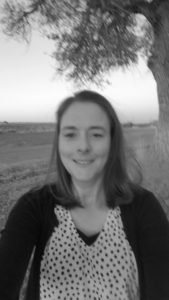Kendra

Disclaimer: The following article mentions the topic of suicide or other sensitive subjects, which may trigger negative thoughts and feelings for those currently suffering or still recovering from a mental or mood disorder. Reader discretion is advised.
In February 2001, I was diagnosed with anxiety and depression after my second child was born. She was two months old when one morning I found that I was too weak to get out of bed. I had been feeling run down for a while but attributed it to having a new baby and sleep deprivation. This was something else. It was whole-body exhaustion, and a feeling of heaviness in my chest, almost like a black hole was sucking the life out of me. Every cell in my body ached, and I was freezing cold, no matter how many blankets were piled on top of me. For six weeks I went to doctors, had medical tests, and waited for results. They couldn’t find anything physically wrong with my body. Then someone suggested depression as a cause of my symptoms. I didn’t want to believe it. I thought that my symptoms were all physical, but with nothing left to go on, I decided it must be depression.
Still, I thought I could beat it on my own. I tried to go back to normal life, but every day was so hard. I felt like I was trying to climb a mountain in the dark. In my mind, I would tell myself that I just needed to change my thoughts. I just needed to eat better, exercise more, and get more sleep. I just needed to be more dedicated to my religious study and efforts. Nothing helped–the darkness and overwhelming fear would always come crashing back on me. Finally, one day in utter desperation, I was praying and the answer I felt was, “Go for help.” I was scared to take medication because I was afraid I wouldn’t be myself on it, but I was more afraid to keep going the way I was. I found a psychiatrist and was diagnosed with anxiety and depression and prescribed medication, which really helped.
For me, I found that religious study and prayer were a lifeline for me. I didn’t feel religiously connected the way I used to because of the intrusive, mixed-up thoughts that came with anxiety and depression, but I felt close to God during religious study. Another thing that helped was music. I memorized religious songs to sing when things got hard and played uplifting music almost constantly. Finally, writing in my journal helped me sort out my thoughts and feelings.
I was doing better until 17 years later when my sister died by suicide after her own battle with mental illness. She was my best friend, and we had shared so much of our struggles and experiences. I watched her struggle with mental illness on her own without medication or any kind of outside help. Although she was hospitalized twice for mental illness, she went off her medication soon after she was released. My parents, siblings, and I could see how much it helped her, but she didn’t like how it made her feel. She tried instead to heal herself through more natural means. She sought religious comfort as well, but nothing helped. One of the saddest things is that her case wasn’t hopeless. There was hope and help for her if she had only given more options a chance.
My sister’s suicide was a wake-up call to me. I used to admire her for being able to “do it on her own” and live without medication. I realized after her death that mental illness really can be fatal and it is so important to seek help when you need it. After my sister’s death, I plunged into a deep depression and knew I needed more help. I found an excellent therapist I connected with, and she has really helped me. I have made more progress since I started working with her than I did in the 17 years before that. I had initially been uncomfortable with the idea of counseling, but it has been a much better experience than I thought it would be and vital to my healing process. In addition to this, I found a doctor that was able to find a better fit for my medication. Together, these things have both helped immensely. Counselors help people identify and change unhealthy thought patterns. Psychiatrists have knowledge and expertise in brain chemistry and medications. When you’re dealing with mental illness it’s helpful to have both a counselor and a psychiatrist because then you’re working on both the cause and the effect of mental illness. The cause is an imbalance of chemicals in the brain, and the effect is distorted thinking. If you can attack it from both sides, you will be much more successful in your recovery.
I still deal with mental illness every day, and sometimes life is still hard, but I am healing. I have hope for the future. Maybe I couldn’t save my sister’s life, but I think she saved mine. I know what it feels like to lose a loved one to suicide, and I didn’t want to do that to my family, so I sought the help that I was too scared to seek before. Love truly is stronger than fear!
